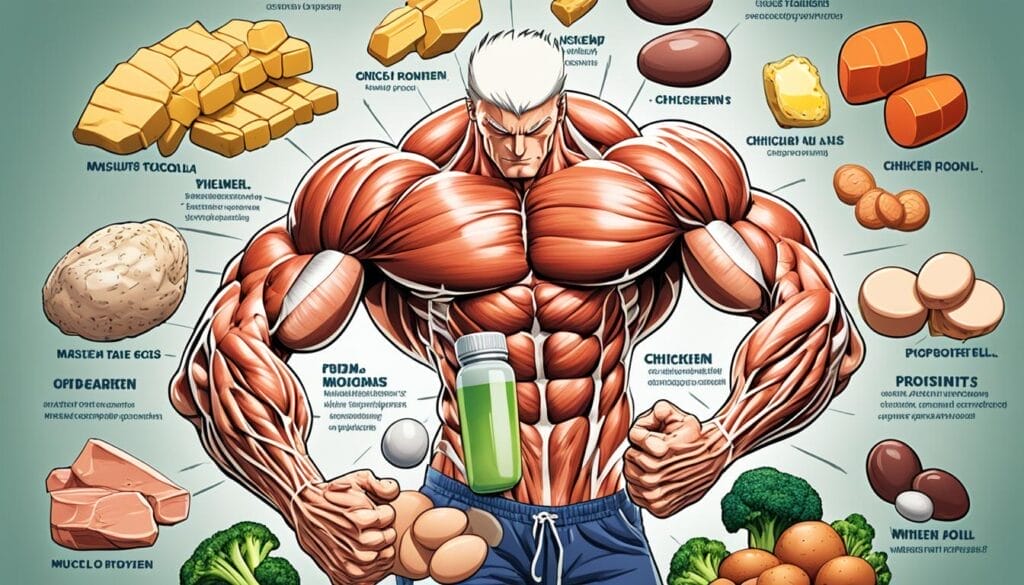Hi there! I can’t wait to share some great advice with you. If you love staying fit, are into sports, or aim to change your body, eating well is key for more muscles. I’ll start with a personal story to get us going.
A few years back, I wanted to improve my muscle mass. I did hard workouts daily but saw no big changes. Then, I understood I forgot about the food side of things. Good muscle building nutrition is like the bottom floor of the house. Without it, you won’t build up much at all.
I learned that eating right is as important as lifting weights. The correct food boosts muscle growth, helps you recover, and makes your workouts better. It also keeps you healthy overall.
Now, with my diet sorted, I designed a meal plan. It included lots of protein and the right nutrition. This strategy helped me achieve goals I once thought were out of reach. Plus, it wasn’t just protein. It was about finding the ideal mix of nutrients, using supplements smartly, and giving my body what it needed.
If you’re eager to supercharge your muscle-building quest, come with me. We’ll explore how best to feed your gains. We’ll discuss protein-powered meals, diets for recovery, bulking tips, and more. You’re going to learn valuable info for hitting your fitness marks.
Key Takeaways:
- Proper nutrition is vital for bulking up.
- An eating plan full of protein, carbs, and other nutrients supports your muscles well.
- Creating meals with a lot of protein can boost your muscle-building efforts.
- Wise use of supplements can give you an edge, but they aren’t a food replacement.
- Sticking to good eating and regular exercise is the secret to reaching your muscle goals.
The Benefits of Building Lean Muscle
Getting fit by building lean muscle is not just about looks. It has many health benefits. Let’s look at the good things muscle does for us:
Increased Basal Metabolic Rate
Building lean muscle can boost your metabolism. Metabolism is how many calories you burn at rest. A faster metabolism means it’s easier to keep off extra weight.
Enhanced Confidence and Overall Appearance
Getting stronger makes you feel good about yourself. It boosts your confidence and you’ll feel proud of your body.
Injury Prevention and Core Strength
Building muscle helps stop injuries. It makes your core (stomach and back) strong. A strong core keeps you stable and less likely to get hurt.
Improved Posture and Bone Density
Muscles help you stand straight. They also make your bones stronger. This helps prevent breaks and diseases like osteoporosis.
Stronger Immune System
Muscle helps your immune system fight sickness. Workouts boost the immune cells in your body. This keeps you healthy.
Counteracting Muscle Loss
We lose muscle as we grow older. This can cause health issues. But, building muscle fights this loss, keeping you strong.
By working out and building muscle, you gain many benefits. So, stay focused, train well, and enjoy becoming a better, healthier you!
Tips for Building Lean Muscle
To build lean muscle, add weights to your exercise routine. Do compound exercises like squats and deadlifts. These exercises use many muscle groups at once.
For me, using weights is crucial to build lean muscle. It pushes your muscles to grow and get stronger. Doing compound exercises means you’re exercising several muscles together.
Compound exercises engage multiple muscle groups, allowing you to work more efficiently and effectively.
Rest days are vital for muscle recovery. Your muscles heal and get stronger during rest. Make sure to include one or two rest days in your week.
Protein is essential for growing and repairing muscles. Include lean meats, fish, eggs, or plant-based foods like tofu in your diet.
Protein is essential for muscle growth and repair.
Carbs and potassium are also important. They give you energy for your workouts. Foods like bananas and spinach help your muscles too.
Lastly, don’t forget about meal planning and staying hydrated. Eating well and drinking enough water support your muscle growth. This keeps your muscles working well and stops tiredness.
Fueling Your Body for Muscle Growth
Here are a few tips to help you fuel your body for muscle growth:
- Incorporate resistance training into your workout routine
- Add weights to regular exercises and perform compound exercises
- Take rest days to allow your muscles to recover and grow
- Include lean sources of protein in your diet
- Consume carbohydrates and potassium for energy and muscle support
- Plan your meals and maintain proper hydration
Sample Workout Routine
Here’s a sample workout routine that incorporates these tips:
| Day | Exercise | Sets | Reps |
|---|---|---|---|
| Monday | Squats | 3 | 10-12 |
| Tuesday | Rest | – | – |
| Wednesday | Bench Press | 3 | 10-12 |
| Thursday | Deadlifts | 3 | 8-10 |
| Friday | Rest | – | – |
| Saturday | Shoulder Press | 3 | 10-12 |
| Sunday | Rest | – | – |

Adding weights, taking rest days, and eating well all help in gaining lean muscle. Remember to monitor how your body responds. Be steady, patient, and your efforts will pay off!
Protein Sources for Muscle Building
Building muscle? Eat lean protein. Foods rich in protein boost your workouts and help your muscles grow. Try these lean protein sources:
- Beans: They’re full of protein and have lots of fibre and vitamins too.
- Quinoa: A great complete protein with all nine essential amino acids.
- Tuna: It’s lean and has omega-3, which is great for your health as well.
- Avocado: It gives you healthy fats and adds to your protein too.
Finding the right mix of protein and carbs is key. It gives you energy for your workouts and helps your muscles repair. Add full-fat milk for both protein and muscle recovery benefits.
| Lean Protein Source | Benefits |
|---|---|
| Beans | High protein content, rich in fiber and vitamins |
| Quinoa | Complete protein source, contains all essential amino acids |
| Tuna | Lean protein with omega-3 fatty acids |
| Avocado | Good source of healthy fats and contributes to protein intake |
Why Focus on Lean Protein Sources?
“Lean protein sources provide the necessary amino acids for muscle growth while minimising fat intake.”
Lean protein is super important for building muscle. It has the key amino acids your muscles need, while keeping fat low. Including these proteins in your diet helps you build muscle and stay fit.
Importance of Nutrition for Muscle Growth
Good nutrition is key for building muscles. During heavy workouts, our muscles grow through hypertrophy. This is when tissue breaks down, then repairs and grows back stronger.
Protein is vital for muscle building. It’s needed for repairing and growing muscle. Getting enough protein helps the body rebuild and recover well.
Carbohydrates are important too. They give energy for tough exercises. Carbs also fill glycogen stores in muscles, aiding recovery and muscle growth.
Proper hydration can’t be ignored either. It helps nutrients reach muscles and removes waste. This makes for better performances and quicker recoveries.
Sleep is key but often forgotten. It’s when the body makes growth hormone for muscle repair. Enough sleep is crucial for muscle growth.
To summarise:
• Adequate protein intake is crucial for muscle hypertrophy and tissue repair.
• Carbohydrates provide the energy needed for intense workouts and promote muscle growth.
• Staying hydrated optimises nutrient delivery and waste removal, supporting muscle recovery.
• Sufficient sleep allows the body to repair and synthesise new muscle tissue.
Focusing on the right muscle building nutrition sets the stage for greater muscle growth. It reminds us to eat well, drink enough water, and get good sleep. This way, we make the most of our workouts and reach our muscle gains.

Incorporating Resistance Training for Muscle Building
To build muscles well, you need resistance training. This kind of workout increases weight or resistance in specific exercises. It makes your muscles grow stronger for sure.
When you do resistance training, knowing your one-repetition maximum (1RM) is crucial. Your 1RM is the heaviest weight you can lift safely once. Figuring this out helps you design workouts that push your muscles just enough.
It’s key to add challenge over time in resistance training. You do this by lifting heavier weights or increasing reps. Even shortening your rest times can help. Doing so keeps your muscles guessing and growing.
Always strive for the right form when you work out. A good posture boosts your results and lowers the chance of getting hurt. Start light, focusing on doing every move correctly. Then you can move on to bigger weights with confidence.
Moves that work more than one muscle are very effective. Squats, deadlifts, bench presses, and pull-ups are examples. These compound exercises are great because they work many parts of your body at once.
Make your resistance training plan diverse. Include exercises for all your muscle groups to avoid imbalances. Mix up movements that hit lots of muscles together, and others that focus on just one.
Stay with your training regularly, but do not overdo it. Exercising 2-3 times a week is enough. Rest is vital for your muscles to recover and grow. Listen to your body and adjust your routine as needed.
To really succeed with resistance training, keep a few things in mind. Always focus on your form, then up the challenge as you grow stronger. Use a variety of exercises, including those that work more than one muscle at a time.

Monitoring Progress and Adjusting Training
Getting stronger means keeping an eye on how you’re doing and tweaking your workouts when needed. It’s vital to check how much weight you can handle regularly. This way, you adjust your plans to build muscles the best possible way.
Strength Assessment
Regular checks let you see your muscle growth and how strong you are. By seeing what you can do, you figure out what has to change to get even better. This helps you set real goals for getting stronger.
Weight Tolerance and Exercise Progression
As muscles grow, you must increase the challenges. Add more weight to keep pushing your muscles. This is how you keep making gains over time.
Reassessment and Adaptation
It’s key to constantly review what’s working. If you adjust weights and exercises, the progress continues without hitting a plateau. This prevents your body from getting too comfy and not making gains.
Understanding Your Body's Response
Knowing how your body reacts is crucial. Feel your muscles during and after workouts. If there’s pain, rethink how you’re doing the exercise. Choose moves that are right for your body to stay away from injuries.
Incorporating proper body mechanics during strength training helps prevent injury and maximizes the effectiveness of your workouts.
Exercise should make you feel strong, not hurt. Always, talk to an expert if something doesn’t feel right. They can help keep you on the right track.

Summing It Up
Building lean muscle needs the right foods and working out. Eat lean protein, carbs, and foods rich in potassium. This gives your body what it needs to grow muscles.
Plan your meals and snacks well. Ensure you rest enough and drink plenty of water. This supports your muscles as they grow. Exercise is key too.
Doing exercises that work many muscles together is good. And, as you get stronger, lift more weight. This will help you get the muscles you want.
It’s also vital to track how you’re doing and change your workout as needed. By sticking with these strategies, you can get healthier and fitter. And, you’ll reach your muscle-building goals.
FAQ
What is the importance of muscle building nutrition?
Building muscle needs the right foods. This is key to grow muscles, get energy for workouts, and help muscles recover.
How does building lean muscle benefit the body?
Lean muscle makes your body work harder even when resting. It also makes you stand tall. Plus, it shields you from harm and losing muscle and makes you feel good about yourself.
What are some tips for building lean muscle effectively?
To get lean muscles, use weights when you exercise. Mix it up with different exercises. Don’t forget to rest your muscles. Eating lots of protein, carbs, and potassium helps too.
Which protein sources are recommended for muscle building?
For muscle growth, choose lean proteins like beans and quinoa. Also, include tuna and avocado in your diet. Balancing protein with carbs is vital.
Why is nutrition important for muscle growth?
Good nutrition supports your muscles. It provides protein for repair, energy from carbs, and water for hydration. Sleep is key too for your muscles to grow well.
How can resistance training be incorporated for muscle building?
To build muscle, use weights and do big exercises that work several muscles at once. Make sure you lift more as you get stronger. But, always use the right technique to avoid getting hurt.
How can progress be monitored and training adjusted for muscle building?
To track your muscle growth, regularly check how much weight you can lift. Then, make it harder when it gets too easy. Always pay attention to how your body feels during training and watch your form to prevent injuries.
What are the key takeaways for muscle building nutrition and training?
Focus on eating the right kind of protein and taking enough breaks. Watch how your muscles grow. Include resistance training in your workouts. Use weights and exercise right to build strong, lean muscles.
Source Links
Share Me:
READY TO UNLEASH
YOUR BEST SELF?
Click “Sign Me Up!” And Start Your Fitness Transformation!





